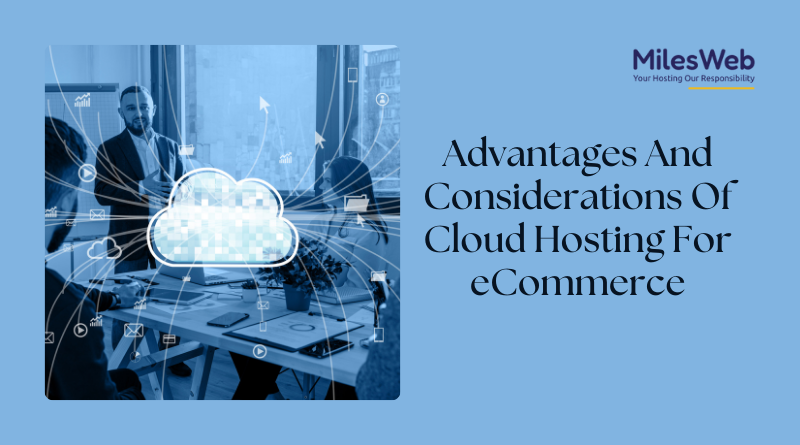
With the rapid growth of eCommerce, there is a high demand for eCommerce hosting solutions that are secure, scalable, high-performing, and, most importantly, based on cPanel cloud hosting. Their key advantages are flexibility, security, and traffic handling ability, which is why cloud hosting is on the rise amongst e-commerce merchants.
However, like every other technology, it has its own set of considerations. So, here we look at the pros and goals so that you understand what needs to be done when choosing Linux cloud server hosting for your eCommerce business.
An e-commerce business faces the sales rush and booms. By opting for cloud hosting, one can always upgrade their server specifications without wasting time. So, for instance, during sale seasons, cloud hosting allows you to expand your servers, meaning more bandwidth and CPU can be supplied without causing interruptions in your sales.
One server failure does not mean a business is down. Due to the interconnected servers in cloud hosting, the moment one server has issues, the other fires up almost instantly, ensuring minimal downtime. This is crucial for eCommerce businesses because a few minutes of downtime can result in a loss in sales and customer trust.
Cloud hosting platforms are made for scalability. They employ CDNs and server farms to ensure that response times and latency are kept to a minimum. For example, cloud hosting service providers such as MilesWeb host cloud infrastructure in a manner that will ensure that loads are optimized so that the endpoint users can interact at will without any issues.
In most cases, cloud hosting is charged based on usage; this makes it easier for various businesses. As opposed to traditional hosting, where a client has to pay a specific amount regardless of whether they need to use the resources or not, with cloud hosting, the price is determined by the amount of power consumed. This model works best for new and expanding companies.
"MilesWeb Internet Services Pvt Ltd"
Let’s Talk: sales@milesweb.com
Since e-commerce businesses have to deal with the sensitive information of their clients, security is critical. Sufficient security encompasses encryption, firewalls, and even DDoS protection, and, of course, routine updates and safety monitoring. So, with such a trustworthy web hosting company, MilesWeb, eCommerce companies always remain certain about the security of their data.
The majority of cloud hosting providers include data centers across the globe. This eventually helps your e-commerce business to cater to clients across the globe and deliver minimal latency. This global infrastructure guarantees that customers worldwide experience quicker page loads and uninterrupted online transactions.
The majority of cloud hosting providers deploy automated backups regularly. Hence, in the event of loss of data and technical failure, a business is able to avail itself of its eCommerce store with minimal interruption.
Cloud hosting is based on pay-as-you-go, so each business can expect to be charged for what they use. It is critical to control expenditures since uncontrolled expenditures can lead to a spike in costs.
Often cloud servers require some technical skills for remote management that come with the purchase of unmanaged subcontracting. Companies like MilesWeb offer dedicated services such as server management, including server updates and server troubleshooting.
Some regulations that eCommerce businesses have to conform to include, but aren’t limited to, GDPR or CCPA. When selecting a cloud hosting service, make sure it complies with these regulations and provides any necessary compliance documentation.
There is no guarantee that all cloud hosting providers will allow for a high degree of customization. Analyze whether the customized hosting solution gives you control over server configuration, software, tools, or other assets that may better serve your business.
A number of proprietary tools and cloud-hosting platforms are employed by some cloud-hosting providers, which complicates moving to another provider. To guard against vendor lock-in, select a provider that utilizes widely used or open solutions.
Go with a hosting provider that provides migration assistance and tools, so you can limit interruptions during the migration.
Businesses offering 24/7 services, such as eCommerce, rely heavily on a support team that is quick to respond. If possible, only work with cloud hosting suppliers who will be ready to provide technical problem support at any time. Providers like MilesWeb are known for their 24/7 customer support, ensuring peace of mind for eCommerce businesses.
For e-commerce companies that want to expand and provide customers with a better marketplace experience, cloud hosting is a viable alternative. However, it depends on your needs and tech know-how. Instead, small businesses start at an easier place by using other managed cloud solutions that ensure performance and security.
As you choose the providers, bear in mind uptime guarantees, scalability, network security features, and host costs. Well-known providers such as MilesWeb have numerous cloud hosting options that cater to the specific needs of the eCommerce industry to ensure growth in a competitive environment.
Cloud offers tremendous built-in benefits for eCommerce businesses, such as scale, cost, and operational efficiency, just to mention a few. As advantageous as this option is to the business, important factors also need to be considered while selecting a hosting provider so that the business environment meets its objectives.
With a suitable cloud hosting provider like MilesWeb, your online store excels in the modern market and encourages growth through more effective purchasing experiences for consumers.